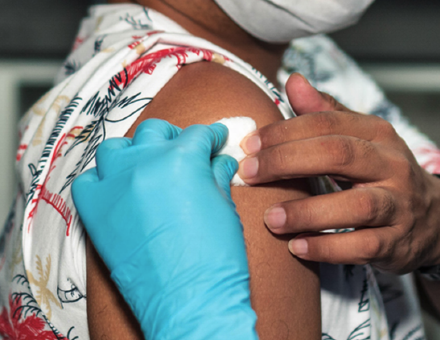SAM Magazine—Lakewood, Colo., Nov. 24, 2021—The National Ski Areas Association (NSAA) has shared new guidance for ski area operators regarding the Nov. 4 OSHA emergency temporary standard (ETS) requiring businesses with 100 employees or more to implement and enforce a mandatory Covid-19 vaccination policy.  Although OSHA has been court ordered to temporarily suspended the ETS, NSAA has advised ski areas not to wait to create and implement a written plan to comply.
Although OSHA has been court ordered to temporarily suspended the ETS, NSAA has advised ski areas not to wait to create and implement a written plan to comply.
“With ongoing court challenges likely to overturn the Biden administration’s OSHA vaccine-or-test rules—perhaps as soon as early or mid-December—so many ski areas are left scratching their heads, worried about compliance but even more worried about the impact on staffing key positions across resorts,” said Dave Byrd, NSAA director of risk and regulatory affairs. “The best advice is to plan as if the OSHA rule is not overturned by the courts, and preparing a compliance plan, starting first with obtaining an employee’s vaccination status.”
The Fifth Circuit Court of Appeals temporarily blocked the ETS Nov. 6. The case is expected to continue up the chain to the Supreme Court. While there exists the real possibility the ETS will be permanently enjoined, if it is upheld, the deadlines for compliance are imminent.
Starting Dec. 5, covered employers must circulate their written vaccination policy, gather the vaccination status of employees, and begin enforcing mask wearing for unvaccinated staff. Effective Jan. 4, employees must be fully vaccinated, and those not fully vaccinated must begin weekly testing for Covid-19.
The ETS provides options for compliance. Covered employers can either implement a mandatory vaccination policy—which OSHA strongly prefers—or adopt a policy requiring employees to get fully vaccinated or undergo weekly testing and wear a face covering at work in lieu of vaccination.
The standard exempts employees who work “exclusively outside,” as well as those who have medical constraints or are federally protected because they have a disability or sincerely-held religious beliefs that conflict with the vaccination requirement.
Non-compliance. Documentation will be critical for businesses subject to the ETS if the rule is not permanently enjoined. Violations of this mandate include not maintaining testing records of unvaccinated employees, not maintaining a vaccination roster of employees, not implementing a written plan pursuant to this ETS, or not documenting negative Covid test results. Standard OSHA penalties for non-compliance will apply—these range from $13,653 per violation to $136,532 for willful or repeated violation.
Employee threshold. There was some debate before the ETS was issued as to how the 100-employee threshold would be counted. The ETS does not include volunteers or independent contractors as employees, but all full-time, part-time, seasonal, minors, and foreign visa holders should be counted. Otherwise-exempt employees are still counted toward the 100-employee threshold as well.
“Even if the OSHA rule is overturned, ski areas likely have been considering what protocols they will adopt separate from any federal or state vaccine mandates—should unvaccinated ski patrollers or instructors be permitted to work with unvaccinated kids? What do we tell parents who call about lessons and instructor vaccines? That’s going to happen, so be prepared for it,” added Byrd.
NSAA members can find the organization’s FAQs and guidance here. OSHA has its own ETS FAQs page here, and the Covid-19 Vaccination and Testing ETS can be read in full here.




